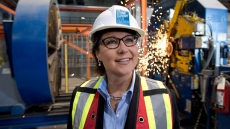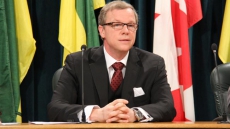More than 50 years after a Saskatchewan uranium mill that is a key part of Canada's nuclear history closed, heavy machinery is once again rumbling across the remote northern corner of the province.
But this time workers at the former Lorado mill are cleaning up a massive pile of radioactive, acidic tailings that has poisoned a lake and threatened the health of wildlife and hunters for decades.
"I think we're a lot more environmentally aware than we were 40 or 50 years ago," said Ian Wilson with the Saskatchewan Research Council, which is the Crown-owned company that's carrying out the cleanup.
The Lorado mill is near Uranium City, less than 50 kilometres from the Northwest Territories boundary. It's where uranium mining once supported a community of up to 5,000 people.
The Canadian Nuclear Safety Commission says the town was one of several in Canada to rise following the Second World War and during a boom in uranium demand that was driven by military needs.
Lorado only operated from 1957 to 1961, but during that time it produced about 227,000 cubic metres of tailings that were dumped beside Nero Lake. The tailings are acidic, according to the environmental impact statement for the cleanup project, and water has run from them into the lake and killed just about everything in it.
Windblown dust from the top of the tailings, the assessment says, also presents "a gamma radiation and radon concern."
Wilson's job is to lead a two-year project in which workers will cover the tailings with a layer of specially engineered sand to prevent water from running over them and into the lake. As well, a lime mixture is to be added to the lake to counteract the acidity.
It's a difficult place to carry out such work.
In 1982, when the last of the mines near Uranium City closed, most people loaded up moving trucks and headed out on an ice road across Lake Athabasca. They left homes, apartments and a new high school empty.
The final mine, the Beaverlodge operation, was quickly decommissioned. But the tailings from the Lorado site and the much larger Gunnar mine were left untouched.
Rae McLeod, who worked a stint in Uranium City as a bank employee in the late 1970s, recalls riding dirt bikes on the Lorado tailings.
"When you're in your early 20s you don't quite have the same sense of mortality and consequences," he said. "We were young and foolish."
Uranium City has about 100 residents now. Some equipment is available from local contractors, but everything else has to come in via plane, barge or the ice road, which is open for only a short period each winter.
"If you're missing a piece of equipment, you can't go to your Home Hardware," Wilson said. "You have to have redundancies and plan ahead."
The project is controversial.
The Prince Albert Grand Council, which represents a dozen First Nations in central and northern Saskatchewan, said in a written submission for the Lorado and Gunnar projects that many residents favour removal of the tailings rather than covering them up.
The Saskatchewan Environmental Society says more investigation should have been done on the feasibility removing the tailings. It questions how the covering will stand up as climate change delivers more severe weather, and whether government will continue to monitor the sites.
"We always get anxious about safety programs that require monitoring and maintenance over an indefinite period of time," the society wrote in its response to the environmental assessment.
Wilson suggested moving the tailings away from Lorado wouldn't be easy. For starters, he said, a safe place would have to be found to put them.
Plus, Nero Lake is mostly contained, and while its radiation is high, it's in an area where the background level is also high, he said.
"This lake is always going to be managed. In Saskatchewan, it's called an institutional control program, where they're monitored and controlled by the province."
Work also includes sealing off and cleaning up 35 mine exploration sites.
Afterwards, the Saskatchewan Research Council is to begin the Gunnar cleanup. That project is in the environmental assessment stage. Wilson hopes work can begin in 2016.
It will probably take five years to complete, Wilson said, and the province says it has so far spent $55 million at the site.
Four million tonnes of tailings were produced at Gunnar during its operation from 1955 to 1963.
Canada officially stopped exporting uranium for weapon production in 1965.
"Back then, the environmental awareness was not what it is now," Wilson said.
"We have different mindsets."





